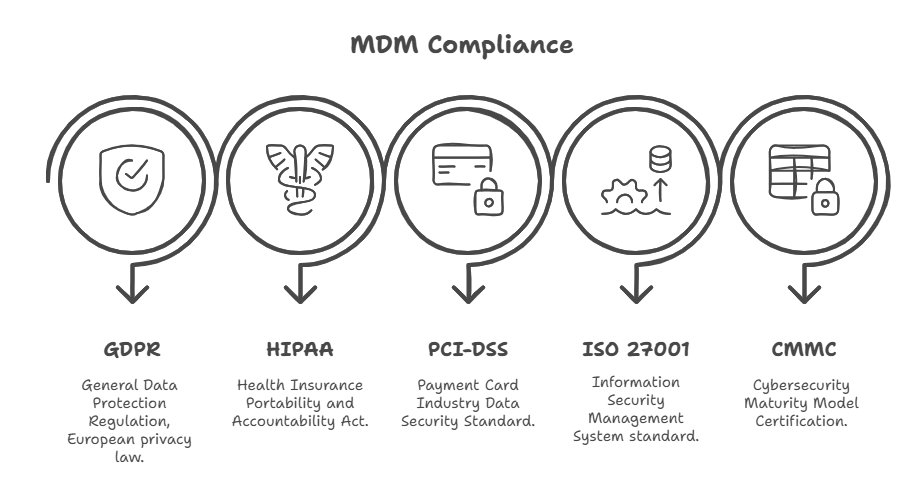What is MDM Compliance & How to Implement
As mobile devices become essential in workplaces, businesses face major challenges, including difficulty in systematically managing device compliance for entire fleets of devices to prevent data leaks, unauthorized access to sensitive information, and the financial or reputational damage caused by compliance gaps. According to Fortinet’s Semiannual 2023 Global Threat Landscape Report, attackers now exploit vulnerabilities 43% faster.
This is where MDM helps, it ensures all mobile devices adhere to established security policies, regulations, and industry standards. In this guide, you'll learn what MDM compliance is and how to implement it effectively.

1What is MDM Compliance?
Mobile Device Management (MDM) compliance ensures that all mobile devices within an organization adhere to industry standards and security policies. This involves using strong passwords, encrypted data, and remote wiping of data. An MDM solution like AirDroid Business helps organizations meet various industry regulations and standards, such as:
- GDPR: Protects the personal data privacy of individuals in the European Union
- HIPAA: Standards to protect sensitive patient health information in the U.S. health sector
- PCI-DSS: Security standards required for the secure handling of credit card data
- ISO 27001: International standard for information security management systems
- CMMC: Cybersecurity compliance for companies working with the U.S. Department of Defense
MDM solutions offer a variety of features for businesses to protect and manage their mobile devices, like remote control and management, security policy enforcement, and kiosk mode, ensuring their mobile devices comply with security and regulatory requirements.
1GDPR: Scope of GDPR in MDM Scenarios
1. Scope of Data Subjects
GDPR applies to the processing of personal data of EU residents, regardless of whether the enterprise or MDM service provider is physically located in the EU. Personal data involved in MDM scenarios may include:
- Device user identity information (such as name, email, employee ID)
- Device identifier (IMEI, MAC address, UUID)
- Device location data, usage logs, and application access records
- Sensitive data stored in the device (such as address book, documents)
2. Role of MDM Service Providers
Divide the responsibilities of enterprises (data controllers) and MDM service providers (data processors):
- Enterprises need to ensure that MDM deployments comply with GDPR
- MDM service providers need to process data according to the instructions of the enterprise and comply with GDPR for processors (such as security measures, data deletion obligations, etc).
2HIPAA: Scope of HIPAA in MDM Scenarios
1. Scope of Data Subjects
HIPAA applies to the protection of individuals' medical records and other personal health information in the United States, regardless of whether the enterprise or MDM service provider is physically located in the US. In MDM scenarios, Protected Health Information (PHI) may include:
- Patient names, phone numbers, and email addresses stored on mobile devices
- Appointment records or medical notes accessed through mobile apps
- Location data or usage logs linked to patient care
2. Role of MDM Service Providers
Divide the responsibilities of covered entities (such as healthcare providers) and business associates (such as MDM service providers):
- Enterprises need to ensure that mobile device management is compliant with HIPAA
- MDM service providers, as business associates, must sign a Business Associate Agreement (BAA) and follow HIPAA rules for handling PHI and breach notifications
3PCI-DSS: Scope of PCI-DSS in MDM Scenarios
1. Scope of Data Subjects
PCI-DSS applies to all types of organizations that process or store credit card information, regardless of their size or transaction volume. In MDM scenarios, PCI-DSS may include:
- Devices used by sales staff or field agents to process payments
- Mobile point-of-sale (mPOS) systems
- Stored cardholder data, transaction logs, or communication between apps and payment gateways
2. Role of MDM Service Providers
Divide the responsibilities of merchants (organizations) and MDM service providers:
- Organizations must ensure that all mobile devices involved in payment processing meet PCI-DSS compliance requirements
- MDM providers should ensure secure device configurations, encryption, logging, and access control features necessary to meet PCI-DSS standards
4ISO 27001: Scope of ISO 27001 in MDM Scenarios
1. Scope of Data Subjects
ISO 27001 applies to all data handled within an organization's ISMS, including data accessed or stored on mobile devices. In MDM scenarios, this may include:
- Corporate emails, documents, and internal communications
- Device identifiers and user access logs
- Sensitive or proprietary business data
2. Role of MDM Service Providers
Divide the responsibilities among enterprise and MDM service providers and they must be clearly outlined:
- Enterprises must define and enforce security controls in line with these requirements across all mobile devices
- MDM service providers must offer capabilities such as device encryption, secure access policies, logging, and auditing to support ISO-compliant practices
5CMMC: Scope of CMMC in MDM Scenarios
1. Scope of Data Subjects
CMMC applies to all Federal Contract Information (FCI) and Controlled Unclassified Information (CUI) handled by organizations in the U.S. Department of Defense (DoD) supply chain, including on mobile devices. In MDM scenarios, this may include:
- Communications containing CUI or FCI
- Device usage logs related to contract work
- Files and documents downloaded or accessed through defense-related applications
2. Role of MDM Service Providers
Allocate clear roles and duties amongst enterprise and MDM service providers and they must be clearly outlined:
- Enterprises must ensure all mobile endpoints used in DoD-related work meet the required CMMC maturity level
- MDM service providers must support features such as data encryption, access control, audit logging, and remote wiping aligned with CMMC practices
Secure Your Mobile Devices with AirDroid Business
Enhance your organization's mobile security with AirDroid Business. Ensure compliance with industry standards like GDPR, HIPAA, and more with our comprehensive MDM solutions.
2How AirDroid Business Helps Enterprises Deploy HIPAA in MDM Compliance
1Introduction of HIPAA
The Health Insurance Portability and Accountability Act (HIPAA) is a U.S federal law, established in 1996, ensuring the protection of sensitive patient data and improving the healthcare system. It sets standards for patients' sensitive health information, which can't be disclosed without the patient's consent or knowledge. HIPAA aims to:
- Protect the confidentiality and integrity of the available Patient Health Information (PHI)
- Ensure the privacy and security of data when health information is created, stored, or transmitted
- Provide patients rights over their health information, such as the ability to access data and request corrections
Healthcare providers and any third-party vendors, like cloud storage and MDM providers, must comply with HIPAA. They must sign a BAA, ensuring compliance with HIPAA. Non-compliance can result in several financial penalties and legal consequences, as data breaches in the healthcare industry are most sensitive and costly. Therefore, ensuring compliance with HIPAA not only protects patient data but also safeguards the industry's reputation.
Here are a few examples of how AirDroid Business, a comprehensive MDM solution, helped healthcare providers ensure compliance with HIPAA by providing various data security features.
2Use Cases
Use Case 1
Company Overview: A healthcare organization needed to manage their mobile devices used by medical staff for patient registration and surveys.
Challenge: Ensuring the patient data stored on mobile devices remained secure and was in compliance with HIPAA regulations.
Solution & Result: Using wholesome support from AirDroid Business, the providers utilized features like authorized access control and encrypted communication. This ensured the confidentiality of patient data stored on mobile devices in compliance with HIPAA requirements. As a result, the organization was able to gain goodwill and keep its confidential patient data secure.
Protect Patient Data with AirDroid Business
Discover how AirDroid Business can safeguard your patient data. Our secure access controls and encrypted communications ensure HIPAA compliance and protect sensitive information.
Use Case 2
Company Overview: A Swedish company deployed sleep trackers in a nursing home worn by users to monitor their sleep patterns.
Challenge: Maintaining the confidentiality and functionality of sleep trackers while accurately collecting sleep data without compromising patient privacy.
Solution & Result: AirDroid Business enabled remote access of sleep trackers, allowing IT teams to remotely update applications and ensure devices were used appropriately and were always functioning smoothly without disruptions. This approach reduced the need for on-site maintenance as the admins could remotely troubleshoot network and operational issues while also protecting patient data and enabling HIPAA compliance.
Use Case 3
Company Overview: A home healthcare agency equipped nurses with tablets while on a field visit to access patient data.
Challenge: Protecting sensitive information on mobile phones while they are used outside the secure confines of a healthcare facility.
Solution & Result: By deploying AirDroid Business solutions, the team remotely managed all tablets and enforced:
- Real-time tracking
- Kiosk mode for authorized app use only
- Remote wipe capabilities
All these features ensured that, in case a device was misplaced or stolen, sensitive PHI would remain protected, aligning with HIPAA compliance. If the device is in public view, the IT professional can even turn on Black Screen Mode, so that no one can view what he is doing. Remote access helps covered entities maintain best-in-class security practices for their devices.
3About AirDroid Business
AirDroid Business is an enterprise-grade Mobile Device Management (MDM) solution designed to help businesses manage and control fleets of Android and Windows devices from a central dashboard. It offers features such as kiosk mode, security policy enforcement, alerts & notifications, geofencing, and bulk file transfers.
AirDroid Business provides remote access and control of devices with real-time monitoring. This means that IT teams can access devices, whether attended or unattended, in order to troubleshoot and fix them in a more timely manner than field-based support. This leads to reduced cost and less downtime along with enhanced security.
With AirDroid Business, your organization’s IT teams can monitor every aspect of device usage. This maintains the integrity of the devices, so that they are not used for any unauthorized purposes that would go against HIPAA and other relevant standards.
3Common Challenges in Achieving MDM Compliance
Diverse Device Ecosystem
Managing a broad spectrum of devices, like tablets, smartphones, and rugged devices, each working on different operating systems like Android, Windows, and iOS, adds layers of complexity in maintaining security policies and ensuring compliance. Each operating system has its security configurations and update mechanisms, making it difficult to manage uniform compliance across all devices.
Solution: Enterprises should adopt a unified MDM solution like AirDroid Business. It enables IT administrators to centrally monitor devices, deploy policies, and remotely control devices irrespective of operating system and device type. Through AirDroid, covered entities can enact a comprehensive security policy, including measures for device limitations, reducing human error, and simplifying regulatory adherence across all endpoints thanks to its seamless integration with different types of devices.
Keeping Up with Regulatory Changes
As old laws are updated and new ones are made, compliance rules are changing constantly, making it difficult for businesses to keep up and ensure that their Mobile Device Management System follows the latest rules. If MDM systems don't stay updated, it results in data breaches and reputational damage.
Solution: Businesses should opt for MDM tools that are up-to-date and add features that support current rules. Tools like automatic policy updates and alerts help companies to stay compliant with current policies and regulations. Working with an MDM provider like Airdroid Business, which keeps track of new rules and updates the system regularly, is important for staying on top of compliance. Implementing strong MDM compliance practices not only safeguards data but also builds trust and improves overall operational efficiency.
4Conclusion
MDM compliance is essential for protecting sensitive data, ensuring device security, and meeting regulatory requirements such as GDPR, HIPAA, PCI-DSS, ISO 27001, and CMMC. As mobile devices become more common in the workplace, managing them properly is no longer optional; it’s a critical part of any organization’s security strategy.
By clearly understanding compliance standards, defining roles, and using a reliable MDM solution like AirDroid Business, enterprises can streamline device management, reduce risks, and stay aligned with evolving regulations.

Download the AirDroid Business MDM Compliance Guide
Learn how AirDroid Business can help your organization achieve seamless MDM compliance. Download our detailed guide to explore features like remote management and security policy enforcement.







Leave a Reply.